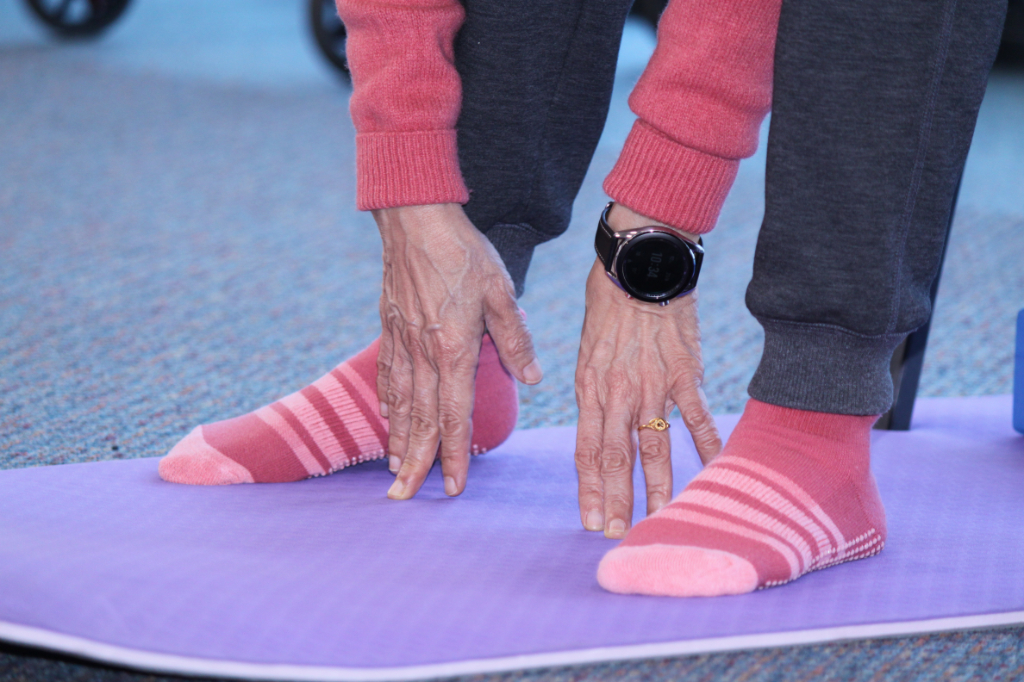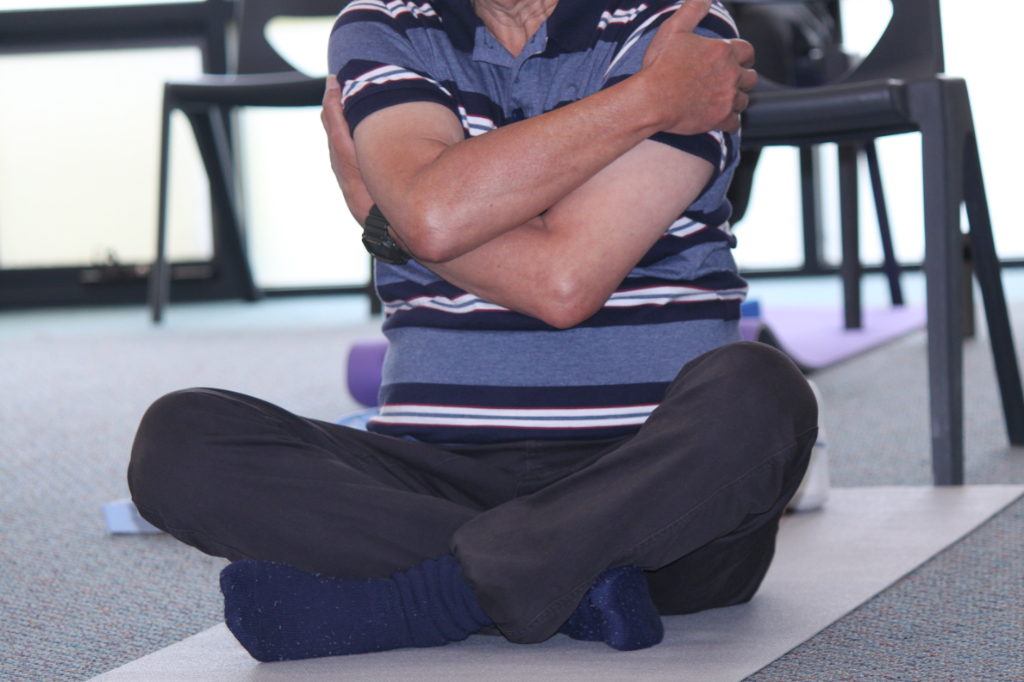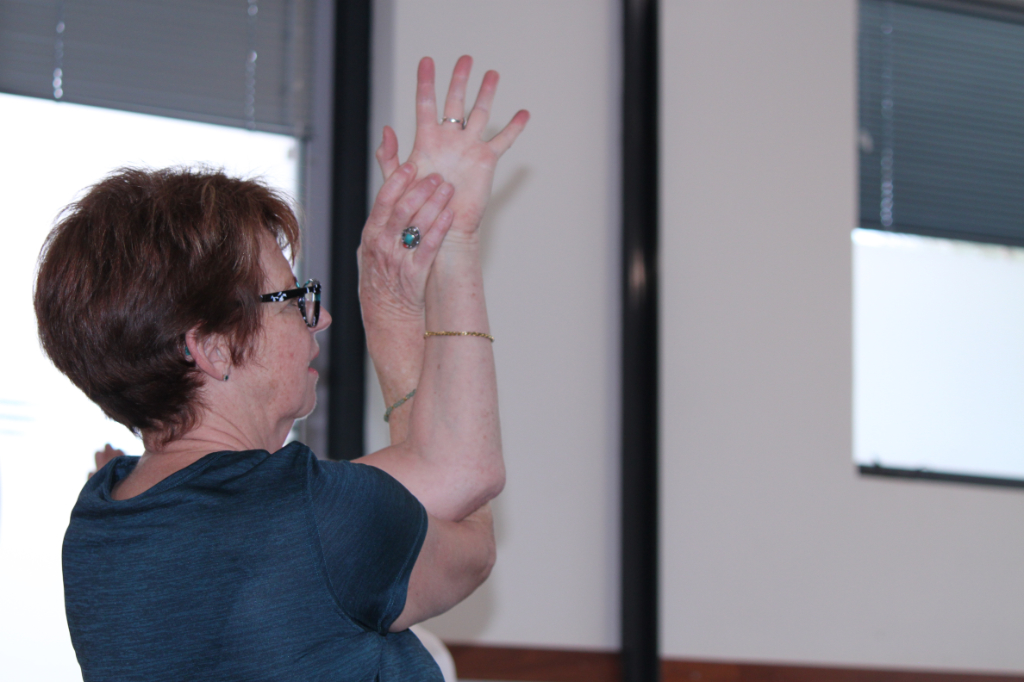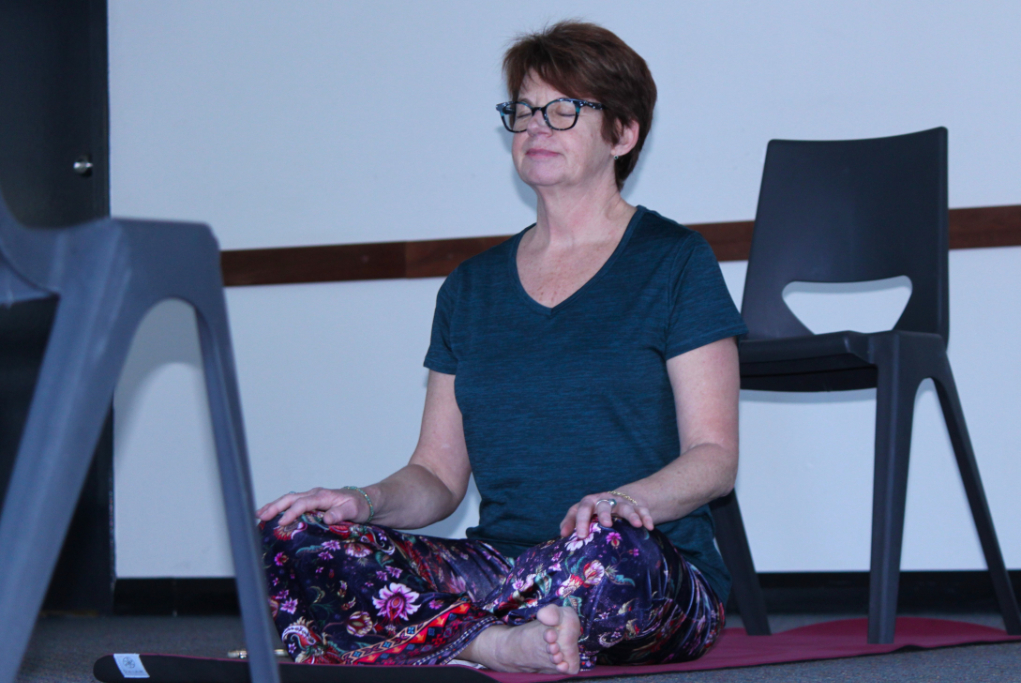Accessible Yoga is for everyone, regardless of age or ability.
“What Yoga offers an individual with Parkinson’s, is one way which may help slow down the progress of the symptoms, both motor and non-motor. It helps an individual to develop peace of mind, inner stillness and, maybe most importantly, ‘acceptance’ of the condition through their practice,” she explained.
“Currently, Parkinson’s is not curable, but research is indicating that forestalling it’s progression may now be possible.”
“Once I accepted the fact that I had Parkinson’s, which I could not control or change (or so I thought), it was more about what I could do to create some control in my life around this challenge, and how I could be the best version of myself mentally, emotionally and physically under the circumstances.”
Amanda teaches a local Yoga Therapy class in Manning with both floor and chair-based exercises that are tailored to the needs of people with Parkinson’s. The accessible class involves gentle stretching, simple but effective Yoga postures, breathwork and relaxation techniques.
Beginning the class with welcome chants and basic warm-ups to stretch all the joints, especially the small ones such as fingers and toes, Amanda sets the tone with relaxing music, reminding participants to tune into the sounds, disconnect their mind from the moment, and find their ‘calm’.
 Pictured: A lady stretches out her hands during a seated Yoga class
Pictured: A lady stretches out her hands during a seated Yoga class
Yoga Therapy is a holistic experience and when channelled with good health, there are marked benefits for those living with neurological conditions, such as Parkinson’s.
Amanda said she felt empowered by the element of holistic wellness embedded in the practice, and when examining prescriptive exercise, we could not examine the physicality only.
“When we look at a Yoga student with Parkinson’s, we might think that the physical level is the most important to work on to improve mobility, however, this is not the case. Practices that support and balance mental and emotional faculties will have just as much, if not more, benefit to the person’s overall health and wellbeing,” she explained with an understanding that she had personally seen this applied through her journey with Parkinson’s.
 Pictured: A man wraps his arms around himself during a Yoga class
Pictured: A man wraps his arms around himself during a Yoga class
Amanda explained excitedly that by embracing a holistic approach to incorporating Yoga Therapy in managing Parkinson’s symptoms, Neuroplasticity can be enhanced with the intensity of practice, therefore, enabling the ability to use tailored exercises to create Neuroplastic changes in the brain.
“What I do know is that at some point you have to pick yourself up and move forward, and I think when you come to a place of some level of acceptance about the diagnosis and, in my case, the acknowledgement that I was not going to die anytime soon from this, it became so much easier to live life to the full by focussing on my future well-being,” Amanda acknowledged with the familiarity of her life’s focus on wellness.
Enhancing this thought, was the gentle, reflective notion of what was to come and how her actions could empower that future.
 Pictured: A Yoga instructor leads the class in a demnonstration.
Pictured: A Yoga instructor leads the class in a demnonstration.
Class participant *Cyndi exclaimed that she could not believe her luck in finding a program such as Amanda’s class that was Parkinson’s-centric, which she said gave her a great deal of comfort.
“Amanda focuses on building strength, flexibility and balance and, possibly because she also has Parkinson’s, she has an innate ability to assess and respond to individual participant’s needs and abilities,” *Cyndi declared.
“Our weekly class consists of fairly even numbers of both men and women, of all ages and abilities. Some use a chair throughout while others are floor-based. Carers are also welcome, she said cheerfully.”
“The class begins and ends with a period of meditation and while I know that I benefit from the Yoga exercises, it’s the meditation element that gives me the most joy. I lead quite a busy life and find it difficult to slow down, but I’m also very conscious of the mental ‘weight’ of Parkinson’s. Amanda’s Yoga has been incredibly beneficial for my mental health - I can’t recommend it highly enough.”
*Cyndi revealed that her Neurologist was encouraged by her progress and had recently commented very positively on her exercise regime, acknowledging how important it was to include a focus on mental health, as well as physical - something intrinsically overlooked.
Ruth was diagnosed with Parkinson’s two years earlier and during that initial process, she received the recommendation to take up Yoga Therapy to help support her Parkinson's symptoms.
“The Yoga classes have improved my flexibility, strength, mobility and gave me my confidence back,” she said.
 Pictured: Amanda focuses in the moment and holds her pose.
Pictured: Amanda focuses in the moment and holds her pose.
“The program has given me techniques on how to relax and breathe when I’m feeling anxious. What I love most about the classes, is that I can go at my own pace, everybody is non-judgemental, and the activity gives me the social outlet of meeting other people in the community who are living with Parkinson’s.”
Parkinson’s WA Parkinson’s Nurse Specialist and 500-hour Yoga Teacher Donna Mallaby, said that the beautiful thing about Yoga, is that it is for everyone, regardless of age or ability.
“Yoga Therapy can aid in overall body strengthening, flexibility and assist with freedom of movement. Yoga can also assist people with Parkinson’s in improving posture, balance, and strength; therefore, reducing the risk of falls and most importantly, improving overall quality of life,” Donna stated.
“Yoga has many benefits, for people living with Parkinson’s. A randomised research trial published in the International Journal of Yoga asserted that Yoga may assist in improving both motor and non-motor symptoms of people with Parkinsons. Modest improvements were seen in balance, functional mobility, mood and sleep.”
Importantly when it comes to Parkinson’s and people living with the condition, the social connections that Yoga can offer are essential for maintaining cognitive function, Donna explains.
You can read the full blog, ‘How does Yoga Therapy Support Parkinson's’ from Donna, here.
Parkinson’s WA support a range of community programs targeting social inclusion, exercise and connection, and you can find out more about Yoga and other activities through our website.
*Names have been changed to protect the privacy and anonymity of the person quoted in the article.
Photos and Words by Jacqui O'Leary